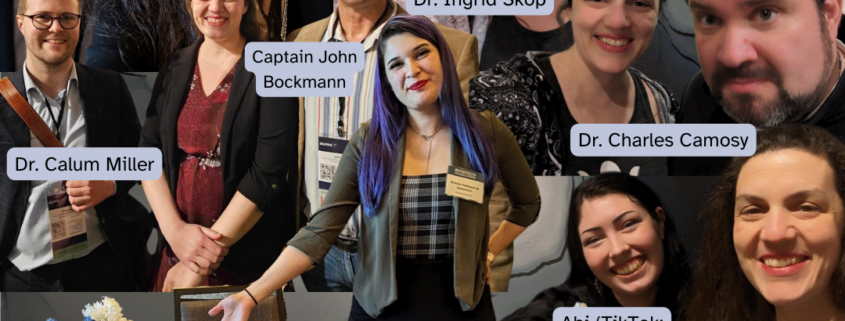2024 AAPLOG conference recap
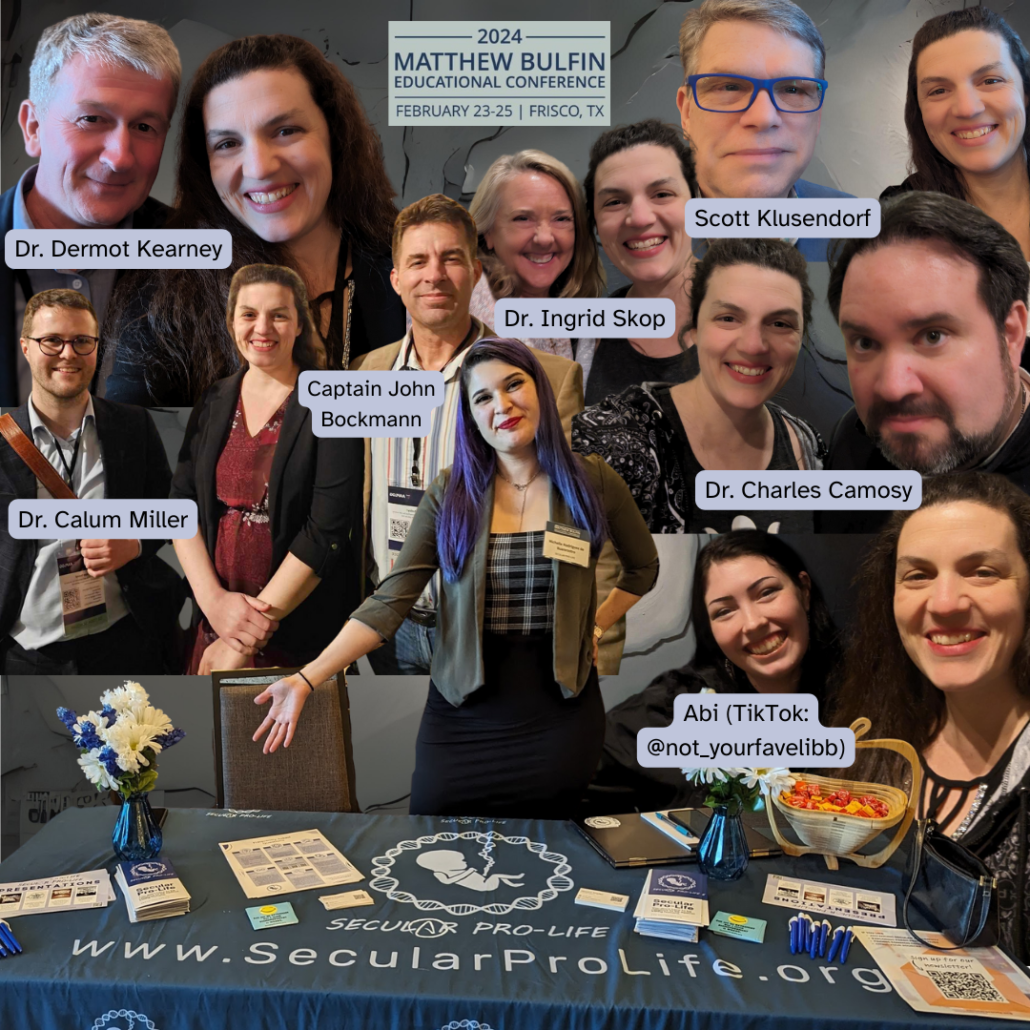
Last week I flew to Dallas for the 2024 Matthew Bulfin Educational Conference (which I refer to as the “AAPLOG conference”). Secular Pro-Life (meaning myself and fellow pro-life atheist Michelle) tabled at the conference, and additionally I had quite a few meetings and social gatherings lined up to make the most of the travel time.
I have a lot of thoughts (which I will elaborate on below), but here is the summary:
The American Association of Pro-Life OBGYNs (AAPLOG) conference was one of the best pro-life events I’ve attended. On aggregate, compared to other pro-life events I’ve attended, the presentations were more data-driven, and conference organizers provided more networking opportunities. I learned a lot and, at least as importantly, I connected with many pro-life leaders coming from a variety of backgrounds and applying an array of talents and experience to problems we’re trying to solve together.
Tabling
First and foremost, a huge thanks to SPL volunteer Michelle, who did a commendable job as our primary tabler for the three day conference. She familiarized herself with our answers to the most common questions conference attendees ask. She looked fabulous in business attire with her ever-changing colorful hair. She even brought a couple vases and white and blue flowers to spruce up our table.
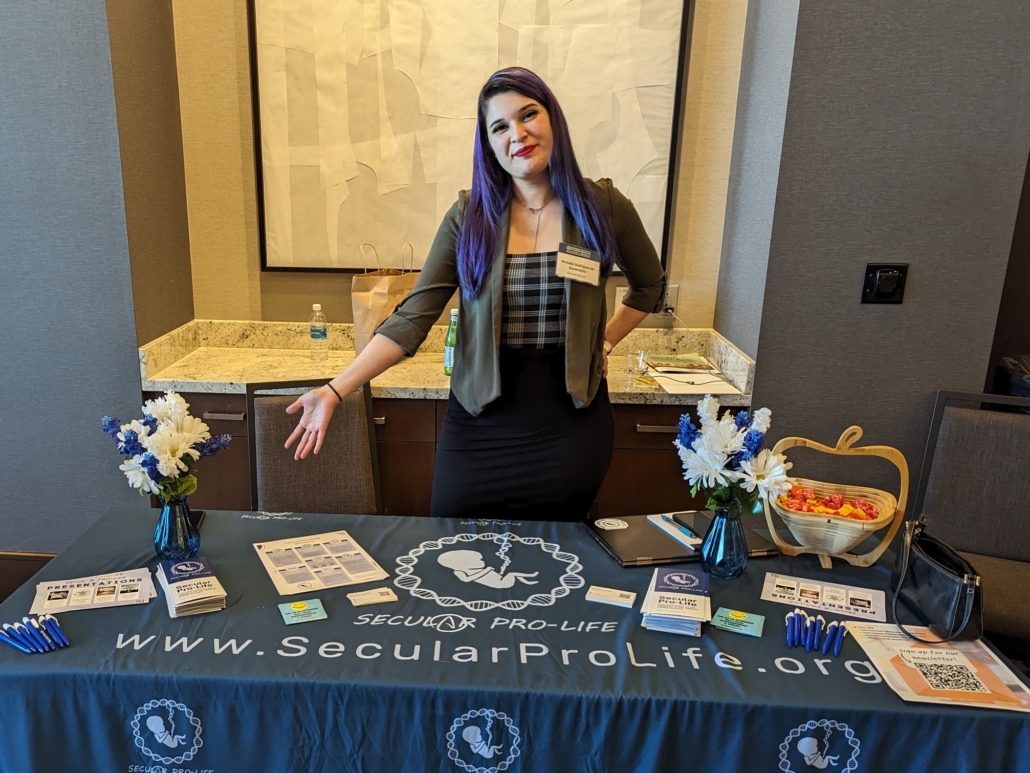
For those of you who haven’t tabled before, it requires staying in the same place for long hours, often discussing the same topics with a lot of different people. Most conversations are polite and pleasant, but there are invariably a few strange or hostile discussion to navigate. Tabling is generally extroverted, marathon kind of discussion, and it’s not for everyone.
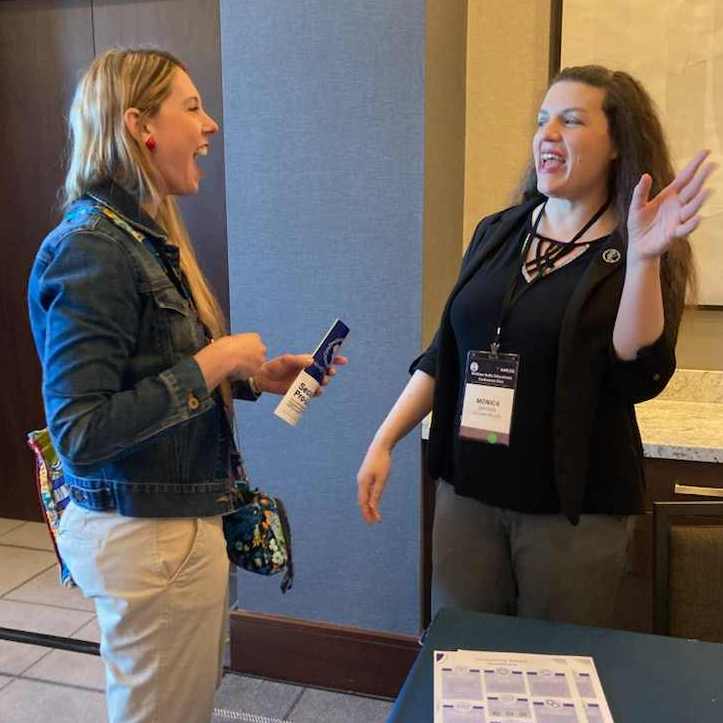
But Michelle was steadfast, which meant SPL had coverage all the time and I was liberated to sit in on conference presentations, record a podcast, and, in particular, create new connections for SPL and strengthen existing ones as I freely navigated networking events, lunch breaks, and other opportunities. Michelle’s help allowed me to make the most of the conference.
(We also found time to film a TikTok about IVF together, and she did great.)
I’ve been volunteering with SPL since 2009, and I took the role of Executive Director in 2021. Since then, people have increasingly told me they recognize me as the face of SPL, but that impression is misleading. Our organization would not exist as it does today (and we wouldn’t be able to produce the quantity and quality of content we do) without our many volunteers, who contribute from all walks of life in all sorts of ways.
I’m thankful for Michelle’s help for this conference, and we’re thankful for all the volunteers who have gotten us to this point.
If you’re interested in helping with SPL, you can fill out our volunteer survey here.
Presentations
There were many presentations I was curious about but ultimately didn’t get to attend because of other opportunities happening at the same time. However, I did get to see several, most notably the following:
- “Addressing the Maternal Mortality Crisis for Minority Women” by Monique Wubbenhorst, MD, MPD
- “Losing Our Dignity: How Secularized Medicine is Undermining Human Equality” by Charles Camosy, PhD
- “Best Practices for Supporting Parents Experiencing a Prenatal Diagnosis” by Tracy Winsor
Dr. Wubbenhorst discussed perhaps a dozen factors that contribute to maternal mortality, some of which are beyond the scope of what formal medical settings can address, many of which are within bounds, all of which could be improved regardless of abortion laws.
Dr. Camosy offered in devastating detail a history of the medical community’s changing definitions of “brain death” based not so much on clinical significance but on a desire to conserve resources that are otherwise allotted to patients with severe neurological injuries or limitations. He revisited this theme (sacrificing patient protections and dignity in exchange for resource conservation) when discussing patient care in nursing facilities, informed consent when parents receive prenatal diagnoses, and comparatively little regulatory concern with regard to unwanted or coerced abortions.
Tracy Winsor discussed research finding that, compared to babies diagnosed prenatally, babies who weren’t diagnosed with Trisomy 13 or Trisomy 18 until after birth were dramatically more likely to survive more than 24 hours and to go home from the hospital.
Children with a postnatal diagnosis were treated “as any other children” until the diagnosis, which may give them a survival advantage, independent of palliative care.
Parental hopes, interventions, and survival of neonates with Trisomy 13 and Trisomy 18, Janvier et al, 2016
Tracy’s presentation also included a 15 minute testimonial from Hannah North, a mother of 3-year-old twins, one of whom is Arrow, a boy with full Trisomy 13. Hannah described how her medical team repeatedly offered her selective reduction and resisted acknowledging even the possibility of survival; Hannah learned that some children with Trisomy 13 can live for years only when she joined a Facebook group for families with loved ones with the condition.
It’s a familiar tune, and it’s all kind of infuriating.
[Read more – Parents can hear you]
Finally, while it wasn’t technically a presentation, I had the opportunity to interview Dr. Christina Francis for AAPLOG’s podcast. We spoke about confusion surrounding what constitutes a medical exception in abortion bans and how pro-life physicians have handled these distinctions since many years before Dobbs. I’m looking forward to them posting it (which may not be for a month or two, depending on editing schedule).
Networking
Tabling gives us the opportunity to talk in person with newcomers about Secular Pro-Life’s work. And the conference presentations are a great way to detail important information to a larger audience. But I believe the most important element, the greatest value added, to attending these events are the new relationships forged and existing relationships strengthened. And the AAPLOG conference was incredible for that.
The following are not at all complete lists, but to give you some idea.
New connections
Scott Klusendorf
Scott is the founder and President of Life Training Institute, and focuses on pro-life apologetics. I’ve known of him for years (I watched the video of his discussion with Dr. Malcolm Potts while prepping to have my own similar discussion with Dr. Potts). He’s referenced numerous times on SPL’s blog. But I’ve never met him in person before.
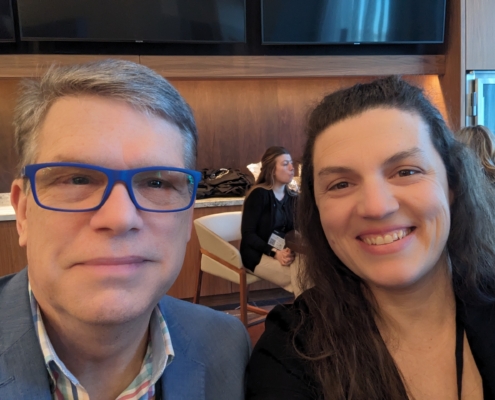
At the AAPLOG conference I was able to sit in on Scott’s presentation alongside Dr. Christina Francis: “The Ethics of Medical Care at the Beginning of Life in a Pluralistic Society.” And I was pleased when Scott, a renowned Christian, went out of his way to emphasize that atheists and other secular people can certainly be “good without God,” i.e. can behave morally and care deeply about ethics absent religious faith. He suggested (and I agree) that interfaith debates are more about how religious vs non-religious people ground their morality and what metaphysical views they may hold to lead to their ideas of right and wrong than about whether non-religious people can behave morally.
[Read more – “Where do atheists think human rights come from?”]
Dr. Francis agreed, and emphasized that medical professionals treating patients from a wide variety of different religious and cultural backgrounds should keep in mind that there can still be plenty of shared understanding and room for effective communication about bioethical issues.
After the presentation, I let them both know how much I appreciated the respectful dialogue about interfaith differences (in my experience it is, unfortunately, definitely not always the standard at pro-life events). Thus ensued introductions and further discussion with Scott about SPL, pro-life work, finding common ground, and similar. Very enjoyable.
Dr. Catherine Wheeler
Dr. Wheeler is an OBGYN who used to provide abortions into the 2nd trimester in private practice for her patients. She has long since stopped, and now speaks up against rebranding elective abortion as simply “healthcare.” I was able to talk with her for quite awhile about her professional and personal changes, and she agreed to be interviewed for the SPL blog (look for that in coming weeks/months).
Dr. Dermot Kearney
Dr. Kearney and Secular Pro-Life have followed each other on Twitter/X for years, but we’ve never spoken much directly and, given he lives overseas, we’ve certainly never met. Yet the evening before the conference I was setting up SPL’s table when who walks by but Dermot Kearney. I recognized him from his profile picture immediately.
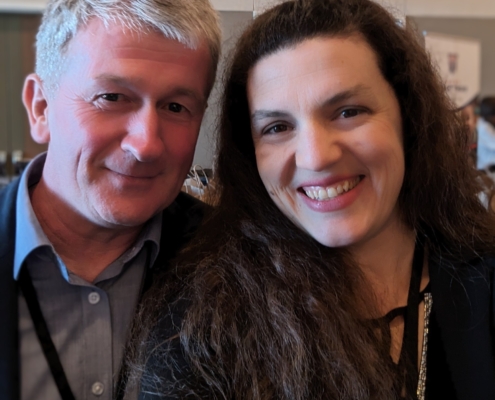
Dr. Kearney, who describes himself as an “Irish exile in England,” is one of only a few medical professionals in the UK offering abortion pill reversal–and not without controversy. When one of the largest abortion providers in the UK complained about this, the General Medical Council (GMC) told Dr. Kearney he was not allowed to “prescribe, administer or recommend” abortion pill reversal pending an investigation. This limitation remained for about nine months (most of 2021 and into 2022), until the GMC concluded that APR was safe for Dr. Kearney to provide.
[Read more – The dishonest claim that abortion pill reversal is dangerous]
Anyway, meeting him in person was lovely. He and his wife were both very sweet, and I know this is very American of me, but I really enjoyed their Irish accents. Now we’re friends, and in touch with one another more directly.
Charlie Camosy
Dr. Camosy (as in PhD, rather than MD) is another Twitter pro-lifer I’ve long followed, but never met in person. Online my impression of him has been a fairly serious and meticulous thinker. I’ve especially appreciated the way he’s discussed intersections of abortion and ableism.
In person, as it turns out, he’s pretty funny. Sarcastic. Happy to joke about our significantly different religious beliefs (or lack thereof). I was laughing pretty hard several times over.
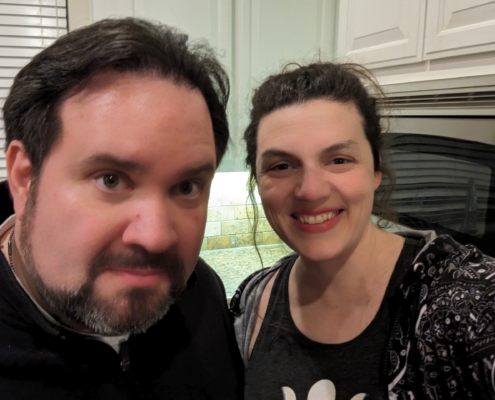
Strengthened connections
Dr. Ingrid Skop
I got to speak to Dr. Skop only a little during the conference, although we’ve talked a few times before. I had really appreciated her article digging into what should be considered life-saving exemptions to Texas abortion law, and I’m hoping to work with her in the future finding ways to better communicate these delineations to medical professionals, legislators, and the public.
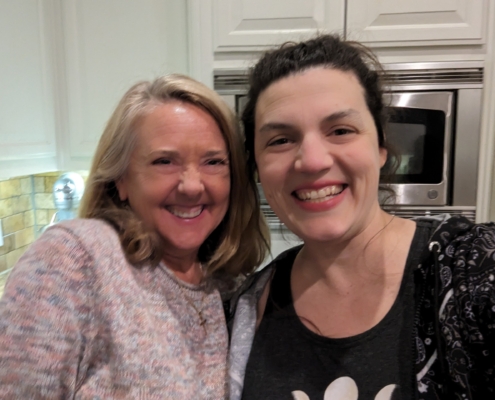
Dr. Calum Miller
Calum is yet another good Twitter follow. He’s also published some content with the SPL blog. I find him to be a wonderful combination of intellect, confidence, and a little snark. Also he seems to know everyone, everywhere, all the time. Mystifying. We’ve hung out at pro-life events a handful of times now, and I always look forward to it.
Major John Bockmann
Bockmann is co-author of the Journal of Medical Ethics article “Reconsidering Fetal Pain.” I first “met” him on Twitter, and interviewed him about how he came to help write that article. He has since written for SPL several times.
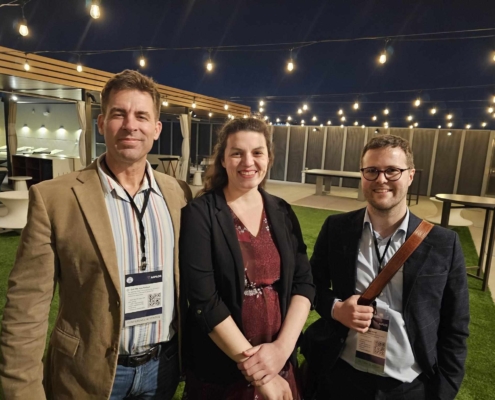
This is the second time I’ve been to a pro-life conference he was also attending, and in both cases he basically served as SPL’s unofficial promoter, speaking our praises to all sorts of people and recommending they go talk to us. (He’s right.)
And more
I’m frankly just running out of energy trying to remember and write out everything, but in addition to the friends above, I also got to meet (or see again) Josiah Friedman, Dr. Robin Pierucci, Dr. Monique Wubbenhorst, Dr. Bridget Thill, Dr. Tom Perille, and Dr. Donna Harrison.
It would be challenging to explain in writing the impacts of being able to spend time in person with all of these people and more. I commiserated with several fellow attendees about the feelings of (release? relief? relaxation?) that come with being among fellow activists, who readily understand the passion and all-consuming focus on fighting abortion.
I have friends who run the gamut of perspectives on abortion. Of course there are major differences between my thoughts/feelings/views and those of my friends who are pro-choice, but there are also notable distinctions between my outspoken myopic anti-abortion stance and some of my friends who are more privately pro-life. It’s all manageable. But it’s wonderful to spend a few days with the other “zealots.”
In addition to the camaraderie, there’s also more space and time for brainstorming, making unexpected connections, developing projects. I won’t outline that publicly here, but it can be very encouraging–and very efficient.
All this to say, the AAPLOG conference was well worth the time. Thanks so much to those of you who helped cover some of our costs to get there. Overall flights, hotel rooms for 3 nights, printing costs for publications and similar cost $2,410.62, and support raising in advance covered 46% of the trip expenses ($1,096.98), leaving about $1,313.64 as yet not covered. If you’re able to help with this in any portion, please donate here.

